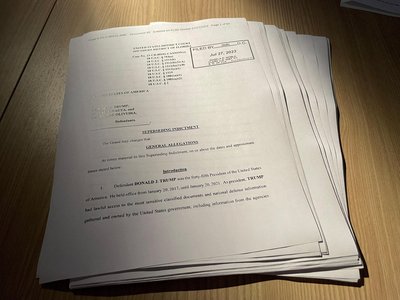This week, all of Washington was alarmed when Senate Minority Leader Mitch McConnell seemed to freeze up mid-sentence. After nearly 20 seconds, he was helped away from the podium by his colleagues. The 81-year-old later came back, said he was fine, and has continued his work. But questions now linger over the future of one of the most influential Republicans in the Capitol.
Clip: Questions linger over McConnell's future in Senate after freezing mid-sentence
Jul. 28, 2023 AT 8:39 p.m. EDT
TRANSCRIPT
Notice: Transcripts are machine and human generated and lightly edited for accuracy. They may contain errors.
William Brangham: This week, all of Washington was alarmed when Senate Minority Leader Mitch McConnell seemed to freeze up midsentence and just stood there. After nearly 20 seconds, he was helped away from the podium by his colleagues.
The 81-year-old senator later came back, said he was fine and has continued to do his work. But questions now linger over the future of one of the most influential Republicans in the nation's capital.
And as this relentless heat wave continues its journey across the country, it is also increasing calls for President Biden to do more to address one of its underlying causes climate change.
Peter Baker to you first about Mitch McConnell. Again, this was just such a striking thing for a figure in Washington politics for as long as he has been to be such an influential figure. He says he's going to continue his term and there're no changes in leadership, but it sounds like the Republicans are concerned about this. What is your sense?
Peter Baker: Yes. I mean, look, Mitch McConnell has been a giant in Washington now for many years, and he has been one of the most successful party leaders we've seen in a long time in the Senate. So, to see him so weakened in this way, I think, has been striking and disturbing for a lot of his friends as well as for some of his rivals.
He, of course, had a fall in March, I believe it was, in which he tripped and broke, I think he got concussion and he was out for six weeks. Apparently, he's now -- we're told he had a couple of other falls and we didn't know about. They use a wheelchair when he goes to the airport to try to get him through to the plane because that's the best way to go forward. So, it reinforces that, at 81, he is having troubles that a lot of 81-year-olds would have.
And this is something we've seen now repeatedly in the last year or so in Washington. Dianne Feinstein, the Democratic senator from California, and, of course, the big issue, the big controversy -- not controversy, but the debate, I would say, over President Biden wanting another term. He himself is 80 right now and hasn't had moments of confusion or tripping over his memory or something like that. Polls show that's been a big concern for President Biden.
So, the person, other than Mitch McConnell and his supporters who's unhappy about this, this week, would be probably President Biden and the White House, which is doing this issue not be front and center. But it reminds us that our leaders are, in fact, human. They do get older. And the question is, at what point is it right for them to step aside and when can they continue to do their jobs?
William Brangham: Anita, in Politico, you all reported just recently that the White House has been watching McConnell in this regard, and that concerns over his leadership, because it used to be the stereotype was that he was the arch villain for Democrats, the guy who denied Merrick Garland a seat on the Supreme Court. But now, as Politico has been reporting, that he has been seen in some ways as a check on the more rambunctious McCarthy House. And I wonder what your sense is as to how Democrats might be thinking about negotiations going forward.
Anita Kumar: Yes. I mean, that's right. And, remember, Joe Biden and Mitch McConnell have a long, long, decades-long history. So, you don't really hear them. They might have a couple funny lines about each other, but you don't really hear them out and out criticizing each other because there is that long history.
And, remember, Joe Biden is the guy who says, look, he can get along with anyone. He can cut deals. It's actually made some people in his party not very happy sometimes. So, we do see that. I mean, there are definitely people that in the Democratic Party, they do feel like he's the villain, right?
I don't think they're going to get that from the White House, but they are feeling that, they are thinking that. You have people in Mitch McConnell's own party thinking, sort of looking at their watch, is this the time? They're not saying that out loud yet, but people are sort of talking about it and whispering it.
I think this week, a lot of people were buzzing about this but they don't want to say it out loud. That's just not the place yet, because he has been around for so, so very long.
William Brangham: And, Leigh Ann, please go ahead.
Leigh Ann Caldwell: I was just going to say, and he has such a grip on his party. There has been -- he had the biggest -- closest challenge he had to his leadership this year when 13 Republicans voted that he should not be the leader. But beyond that, he has, like I said, such a grip on his party.
And no one -- it's interesting, I was talking to a Republican source on Monday, and I asked about McConnell's health. And this --
William Brangham: This is prior to this event.
Leigh Ann Caldwell: This is prior to this, what people are saying, what people are talking about. We know he had the head injury. And this source said no one talks about it.
They think his mind is still very strong. No one talks about his age or him getting older. And then this incident happened. People started talking about it a little bit more. But still, no one is willing to come out and challenge him.
And his team reminds us that he has had a long history of falls. He is a polio survivor. He fractured his shoulder in 2019 by falling on his porch. And so they're saying they are also trying to reinforce that he is mentally completely there. He just has always had physical challenges.
William Brangham: Peter Baker, I want to turn lastly to this issue that we are all experiencing, at least currently almost half the country living under these just stupendous heat waves. These have re, again, brought up this push to press Biden, even though he has already passed some substantive legislation, to address climate change, to do more.
And I wonder if you think that this kind of a calamity that we are living through with electrical grids being taxed all over the country and people literally sweltering, if this does really dial up the pressure on the president, and what he might do with that?
Peter Baker: Yes, that's a really good question because of course you're right, he did pass $350 billion worth of climate action last year as part of the Inflation Reduction Act, the largest expenditure on climate issues in our history, and yet that doesn't necessarily mean that that's enough, right? A lot of climate activists would say fine, good start, keep going, don't sit there and count your laurels at this point.
The question is whether the heat wave we're seeing, the kind of climate impacts we're seeing right now, change the political dynamic at home, right? Does that build a larger, more broad-based consensus among everyday people who can now look outside and see the impact of climate change on their own lives? They can't send their kids to camp. Their air conditions may break, in which case they don't know what to do at night with their families, that their work is more complicated because of the heat. And if this impacts their lives and they associate with climate change, does that mean that the political environment changes over time?
Now, there are a lot of people who say, look, this is just weather, weather happens, it's not a sign of anything all that big. The question is whether or not the arguments that climate activists have been making get through in a moment like this when people see it in their everyday lives.
William Brangham: Leigh Ann, in the last 30 seconds we have, is your sense that this moves the needled, especially with Republicans who have basically shown a good deal of intransigence on any climate action?
Leigh Ann Caldwell: Not really, no. They are still on all of the above energy policy, as far as Republicans are concerned, even the White House too, but they really are intent on ensuring that fossil fuels remain a central part of our energy sector. There are outliers within the Republican Party but not really. We have not seen a major shift yet.
William Brangham: All right. I think we are going to have to leave it there for tonight. Thank you all so much for joining us and for Peter joining us remotely. And thanks to all of you for joining us as well.
FROM THIS EPISODE


Clip: New charges against Trump allege cover-up attempt in classified documents case


Full Episode: Washington Week full episode, July 28, 2023

© 1996 - 2026 WETA. All Rights Reserved.
PBS is a 501(c)(3) not-for-profit organization
